Mining Concessions for the Medan Block
The term “Medan Block” emerged during the trial of former North Maluku Governor, Abdul Gani Kasuba. Medan Block is believed to refer to pre-allocated nickel mining concessions in Halmahera.
maaf email atau password anda salah
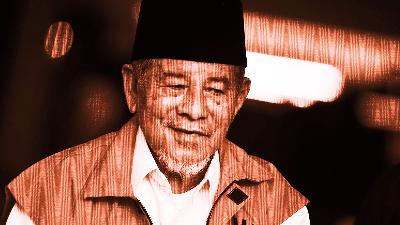
The term “Medan Block” emerged during the trial of former North Maluku Governor, Abdul Gani Kasuba. Medan Block is believed to refer to pre-allocated nickel mining concessions in Halmahera.

The rupiah is weakening amid the power transition, with global factors also exerting heavy pressure.

Driven by corporate demand, helicopter business opportunities continue to grow. Operators are increasingly expanding their fleets.
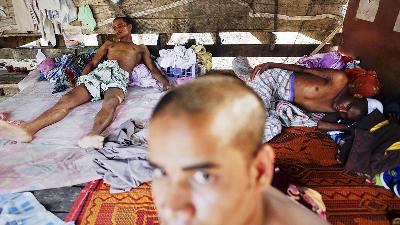
Rohingya refugees in Thailand, Malaysia, and the Philippines are treated differently than those in Indonesia.
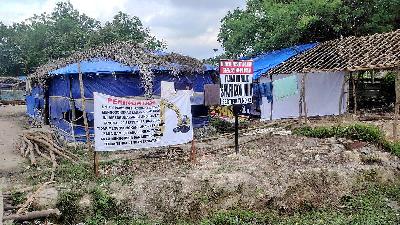
The Rohingya refugees living in Pekanbaru have more freedom to move around and reside in lodgings. Their children can also attend school.

The increasingly overcrowded refugee camps demand improvements in the mechanisms for handling Rohingya refugees. The number of refugees continues to rise.

Several Rohingya refugees successfully built their careers in various fields. They continued to work and raised awareness about the plight of displaced Rohingya refugees.

Rohingya refugees are still living in several inadequate temporary shelters in Aceh.

The KPK should designate Sahbirin Noor a fugitive. There is a good chance the South Kalimantan Governor will go free.

The Joko Widodo administration leaves a heavy burden for state-owned enterprises. Many projects result in big debts.
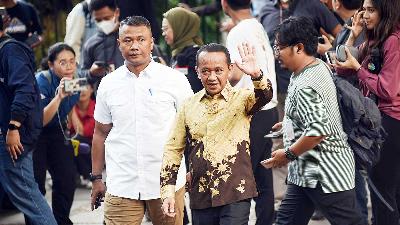
President Jokowi entrusted his confidants to join Prabowo’s cabinet. Several ‘volunteers’ also received positions.

The Stock Exchange detects alleged violations in the IPO of Barito Renewables Energy. There are indications of maneuvering around public shareholding requirements.

There are indications that the selection of the KPK leadership for the 2024 to 2029 period is in breach of a Constitutional Court ruling. The process needs to be rerun.

The KPK Leadership and Supervisory Board Selection Committee claimed to have followed procedures, and Jokowi reportedly did not intervene.
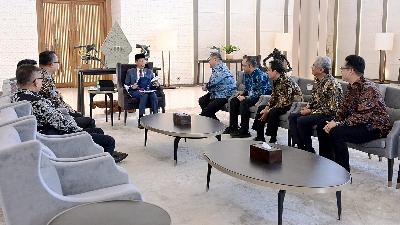
Various parties from the National Police Chief to the State Palace are accused of interfering in the KPK leadership candidates selection process. The candidates are divided into four clusters.

The KPK is investigating Taspen’s investment losses. Sinarmas is behind the transaction.

The family members of some ministers enter the fishery business. Other problems, such as the activity of illegal foreign vessels and the abuse of crew members, still prevail.

Explanations from State Secretary Minister Pratikno and Maritime Affairs and Fisheries Ministry on fishery business and the case of illegal ships in eastern Indonesia.
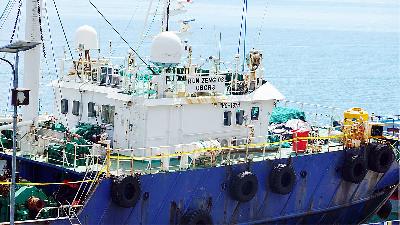
Illegal fishing and slavery continue to occur in Indonesian waters. Crew members are vulnerable to abuse.

Minister Sakti Wahyu Trenggono revives a shutdown port. There is indication that the minister’s son is involved in the fisheries business.
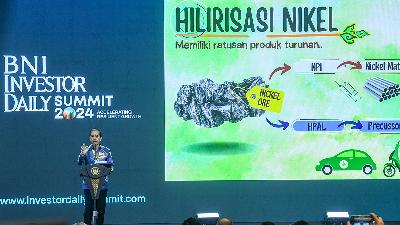
Jokowi’s campaign promoting his successes is considered as not portraying actual conditions. Customary communities are among the victims of his administration.
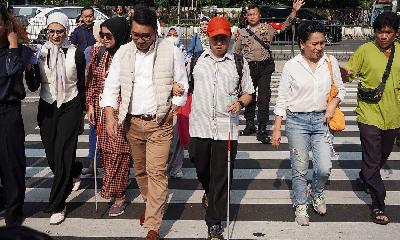
Jakarta governor and deputy governor candidates promise improvements in inclusive public transportation.

Jakarta is striving to provide inclusive transportation, but challenges remain, from funding issues to construction oversight.

Despite some improvements, much still needs to be done regarding access to public transport for people with disabilities.

The contest for the selection of the Supreme Court Chief Justice is heating up. There are indications it is riddled with the interests of the government and tycoons.
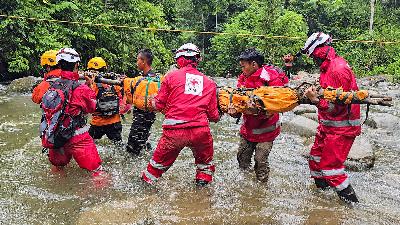
Illegal gold mines that collapsed in Solok Regency, West Sumatra, damage the Batanghari watershed. Authorities are suspected of protecting investors.

Luhut explains his close ties with Jokowi, and the plans of the president-elect Prabowo. This is his first interview with Tempo after the one on the Panama Papers eight years ago.
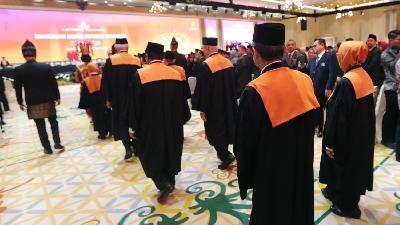
The race for the position of Chief Justice of the Supreme Court is heating up amid a flurry of allegations against certain candidates. There is suspicion of backing from business circles.

Indonesia and other countries continue to oppose the European Union’s Deforestation Regulation. The European Commission proposes a delay.

Media companies are experiencing upheaval due to the rapid changes in the business landscape. The industry is moving towards a new equilibrium.

Using a variety of pretexts, the political parties replace elected legislative candidates. This is a betrayal of the people’s choice.

The kidnapping of pilot Phillip Mehrtens was ended through negotiation. This is a lesson for the Prabowo administration about how to resolve the Papua conflict.
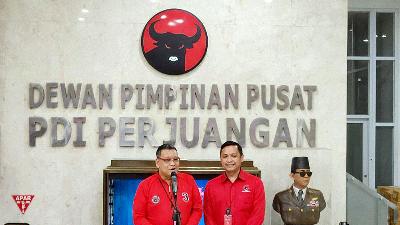
Political parties replace elected legislative members over alleged vote manipulation.
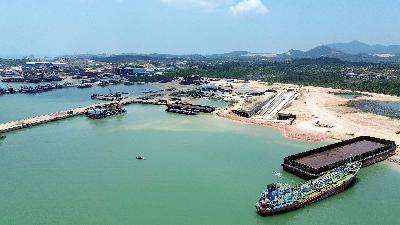
Dozens of companies are seeking permits to process marine sediment. They include businessmen, regional head candidates, and former cabinet ministers.

Indonesia is poised to fall into the middle-income trap. Only a few people enjoy the economy pie.

In many nations, history seems to be covered up so that its narrative never progresses.

The clearing of forests for the food estate project does not yet have an environmental impact assessment. It will be issued later.

Two food estate projects are simultaneously being launched, targeting 2.29 million hectares of forest and land in Merauke. There are intrigues involving Prabowo and Jokowi. This report is part of a collaborative coverage and research initiative by Tempo, the Pusaka Bentala Rakyat Foundation, and Trend Asia.
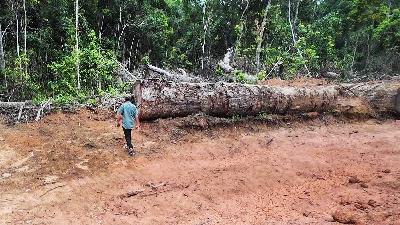
The rice paddy development program will sacrifice 1.02 million hectares of customary land in Merauke. It will also annihilate biodiversity.

The Fed and Bank Indonesia cut rates, allowing the banks to gain maximum profit.

The selection of the KPK leadership is being forced through before the end of the terms of the DPR and Jokowi. Watch out for Presidential Palace appointees.
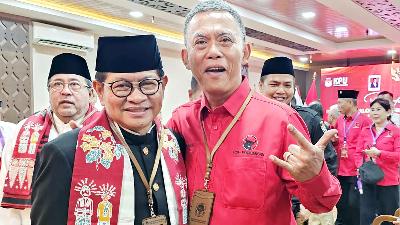
Two rivals in Jakarta’s upcoming regional elections are sharpening their winning strategies. There is a rift in the Indonesia Onward Coalition.

Gubernatorial candidates are trying to win over the votes of Anies Baswedan supporters in the Jakarta regional election. Jokowi reportedly shifted his support.

Pramono Anung and Ridwan Kamil shed light on the dynamics surrounding their appointments as Jakarta gubernatorial candidates.
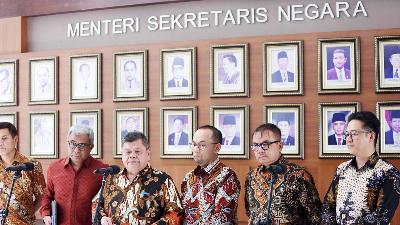
News summary on the conflict of interest of KPK leadership candidates and 44 ministries in Prabowo’s government.

The Language Agency uses artificial intelligence to preserve endangered regional languages, starting with the creation of a vast corpus data.

The business of digital signatures and e-stamps is booming, as regulations push digital certificate providers to rake in profits.

Foreign companies are urging President Joko Widodo to implement the power wheeling scheme. The private sector is pushing to hasten the energy transition.

Articles on power wheeling prevent the legislation of a New and Renewable Energy Bill. State electricity company PLN’s unique position could be left precarious.

There is increasingly compelling evidence of a gratification in the form of a private jet for Kaesang Pangarep. The KPK could investigate this thoroughly.

The DPR rejected all candidates for Supreme Court and ad hoc human rights justices put forward by the Judicial Commission. There needs to be transparency in the selection process.
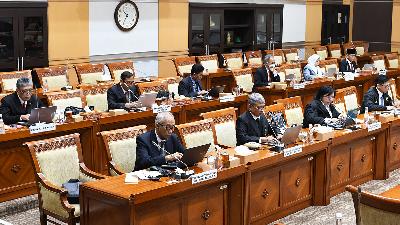
Commission III of the House of Representatives rejected all the Supreme Court judge candidates proposed by the Judicial Commission. The rejection allegedly was due to their favored candidate failed to pass.
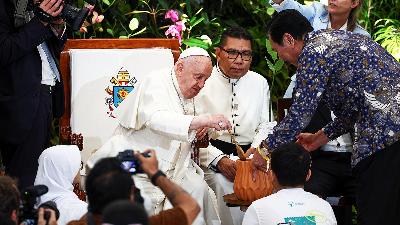
Indonesia and the Vatican enjoyed a good relationship long before the Pope’s visit. The Vatican reportedly helped Indonesia lobby the European Union.
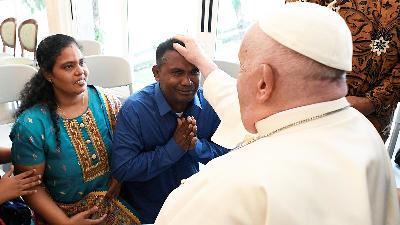
The first agenda item on Pope Francis’ visit was to meet with marginalized communities. The Pope encourages Catholic Church leaders to welcome Muslim refugees.

Pope Francis received a warm welcome on his visit to Indonesia. Appearing with simplicity, he brought a mission of inter-faith dialogue.

A biomass plant has the potential to clear 693,795 hectares of Gorontalo’s forest. The raw material for the wood pellets intended for export comes from deforestation.

The culinary businesses of Gibran Rakabuming and Kaesang Pangarep are fading. This seems to contradict their massive financing.

Persis Solo attracts substantial funding since Kaesang Pangarep acquired its shares. Sponsors tend to be influenced by the prominence of the owner.
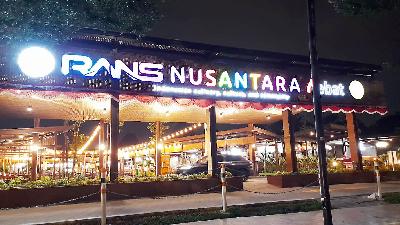
Startups owned by Gibran Rakabuming Raka and Kaesang Pangarep are flooded with venture capital injections. Assisted by a presidential advisor.

A photograph of a private jet window exposes Kaesang Pangarep and Gibran Rakabuming Raka’s connections to a network of business actors.
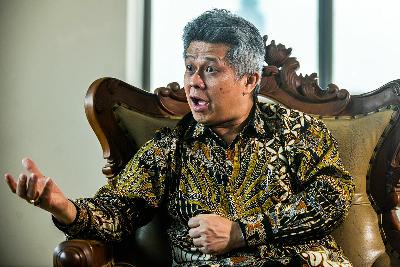
Chair of the Presidium of the Indonesian Bishops' Conference (KWI) Monsignor Antonius Subianto Bunjamin spoke about the preparations for Pope Francis’ visit.

Several political parties conspired to approve candidates for the Supreme Audit Agency (BPK) membership. Corrupt candidates could be selected.
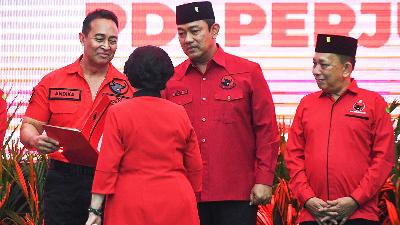
The Indonesian Democratic Party of Struggle (PDIP) strives to counter candidates supported by the Palace. It is an early projection for the 2029 General Elections.

Police act excessively in handling the demonstrations nationwide in support of the Constitutional Court decision. Where are the President and Vice President?
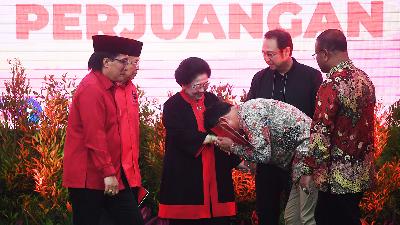
The PDI-P will be nominating Anies Baswedan in the Jakarta gubernatorial election. A popular candidate against Jokowi’s coalition.
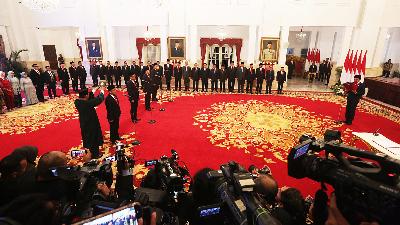
Two months before stepping down, Jokowi reshuffled the cabinet, selecting close allies of Prabowo Subianto.

BRIN is designing the Peluit-40 nuclear reactor to replace diesel power plants, claiming it to be safer.

The greatest enemy of the masses is power. While the masses produce density, power produces distance.

It is natural for someone to want their children, relatives, or close friends to get a position. However, facilitating them to receive that position at the expense of ethics, law, and justice, it may end up in practices of nepotism.

Mohammad Hoesni Thamrin put the interests of the people above everything. He fought hard for our independence.
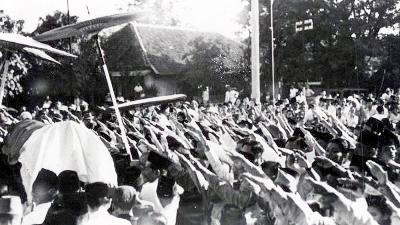
During the last days before his death, M.H. Thamrin was under house arrest, accused of attempting to subvert the Dutch colonial government.
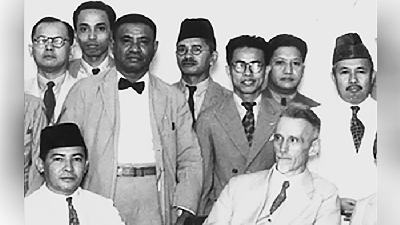
M.H. Thamrin was not the type of council member who would simply show up, sit down, remain silent, and collect a paycheck. The Tiger of Volksraad was highly militant and vocal in championing the people’s interests. His roar resonated as far as Europe and America.
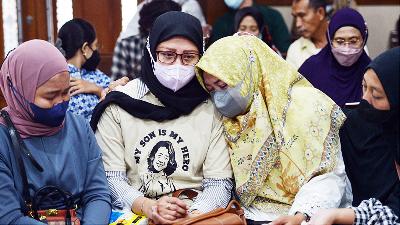
Families of children suffering from acute kidney failure still seek justice. The number of children undergoing dialysis is reportedly on the rise.

Born into a wealthy family, Mohammad Hoesni Thamrin became the lion of the City Council. A freedom fighter who fought for the weak.

The definition of “Indonesia” transcends old walls. Indonesians are anyone who considers it their homeland.

The work and strategies of the Online Gambling Task Force lack clear direction. It should be focusing on the gambling bosses.

The opportunity for Anies Baswedan to contest the Jakarta gubernatorial election is slipping away after the coalition of parties supporting him fell apart. There is a guerrilla from the Palace.

An exclusive Tempo interview with Anies Baswedan regarding his chances to run in the Jakarta regional head election.

Jokowi and Prabowo’s coalition are maneuvering to thwart Anies Baswedan’s candidacy in the Jakarta regional head election. Cabinet posts are being offered as inducements.

The government plans to expand the list of goods subject to tax. However, attempts to broaden excise taxes often face public resistance.

Consumers are downtrading their cigarette choices as tax rates rise, leading to an increase in cheap cigarettes and a persistent smoking prevalence.

Tommy Hermawan Lo’s name emerges following the mention of Mr. T in online gambling that involves human trafficking case. He is a director at a casino management company.
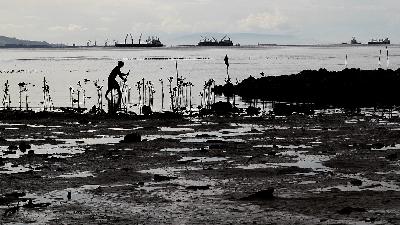
The proposal to extend the tenure of the Peatland and Mangrove Restoration Agency is suspected to be driven by the Environment and Forestry Ministry’s desire to take over the management of all mangroves. The Maritime Affairs and Fisheries Ministry strongly rejects it.

The battle in the presidential election is set to continue in regional head elections. The PDI-P is determined to challenge President Joko Widodo’s candidates.
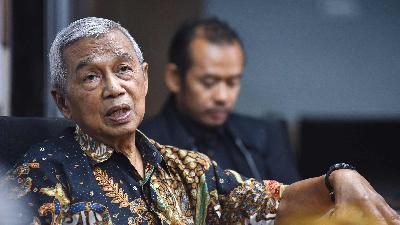
Muhammadiyah accepts the government’s mining concession offer. Many members are against it. Busyro Muqoddas, Chair of Muhammadiyah’s Law and Human Rights Council explains.

The government provides facilities to make it easy for religious organizations to manage mines. Offers discounts on information data compensation rate.

Muhammadiyah cadres and administrators are divided in their response to the mining concession. There are whispers from the government and the entrepreneurs.

Government debt breached the limit. Markets await a signal of prudent fiscal management from the incoming president.

Javanese Pinocchio left behind a culture of lies in politics. Lie after lie grows into a dirty trick to achieve more power.

Jokowi was initially considered as a good person and a man of the people. But he broke the hopes of those who voted for him.
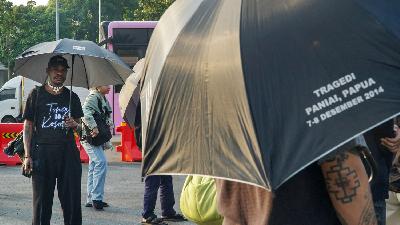
Jokowi did not resolve any serious human rights violations in the past decade. The National Commission on Human Rights and prosecutors are at odds over evidence.

Retno Marsudi dismissed the idea that the government is merely meddling foreign affairs. She emphasized that Indonesia is a trusted partner on the international stage.

As the country attempts to mediate major issues, Indonesia’s foreign policy appears vibrant but lacks a strong foundation.
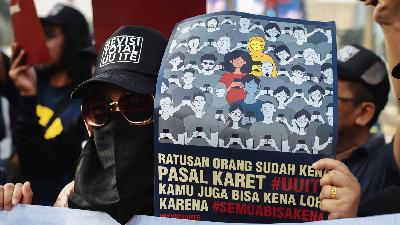
Various cases of hacking and freedom of expression violations are rampant during Jokowi’s presidency. Victims range from public figures to ordinary people.
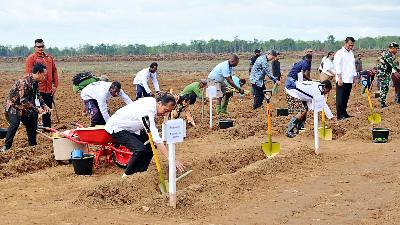
In a decade of Jokowi’s administration, deforestation reached 4.37 million hectares. This is partly attributed to national strategic projects in the food and energy sectors.
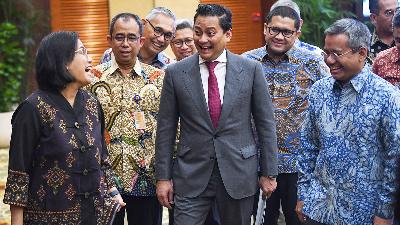
People close to Prabowo Subianto will be given strategic posts. Jokowi gives his blessing.
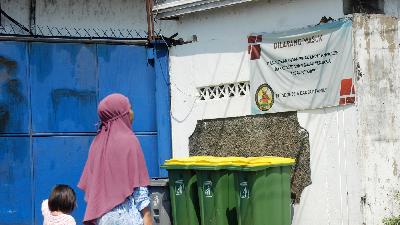
Producers of Okko and Aoka breads suspect elements of business competition.

The BPOM does not approve the use of sodium dehydroacetate as a food ingredient. Emma Setyawati, acting Deputy for the Supervision of Processed Foods at BPOM explains.

Two bread brands are suspected of using a type of preservative that is not allowed in food. It is believed as a way to attack small and medium-scale bread producers.

The presence of Okko and Aoka disturbs home-industry breads produced by micro, small and medium businesses.

According to Prasada Rao, ignorance has been the biggest barrier in dealing with the decades-old HIV/AIDS epidemic. This is why he speaks openly about the disease, freely discussing such topics as sex and sex education, which most Asians see as taboo, so that the social stigma attached to its victims can be erased, a first step in the prevention and treatment of the disease.
Rao truly believes that an open discussion of the subject would be the best protection against the disease, yet the biggest challenge in addressing this global epidemic. "For Asians, sex is taboo. It's in your bedroom, not on the road. So there's always that challenge," he told Tempo.

A book by 68-year-old Japanese Indonesianist Aiko Kurasawa, Japanese Power in Java: Social Change in Rural Java 1942-1945, which was re-published this year, is a rare work. Based on Kurasawa's dissertation at Cornell University, the book is a comprehensive study on Japan's policy of mobilization through romusha (forced labor) and other practices that exploited the peoples of rural Java.

To some conservative Japanese reactionaries, writer Aiko Kurasawa is unpatriotic because she wrote a book on the cruelty of the Japanese military in Javanese villages. She has been branded by some as a communist. Kurasawa's interest in Indonesia began a long time ago, when she first read about Sukarno, whom she regards as a hero of the Asia-African movement. Not surprisingly, when the 1965 events exploded, she was devastated upon reading about the resulting fall of Sukarno. "I was shocked," said Kurasawa, who was recently interviewed at her home in south Jakarta.
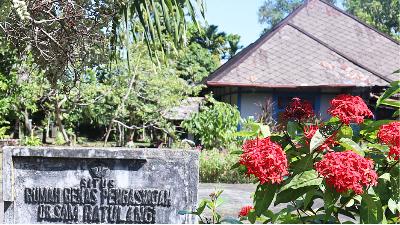
Silas Papare and some residents in Serui founded the Irian Indonesian Independence Party. They were assisted by Sam Ratulangi.

Silas Papare helped the Allies fight against the Japanese in West Irian. He supported Indonesian independence because of conflict with the Netherlands.
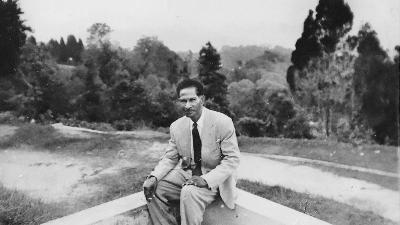
Silas Papare was close to Sukarno. He refused to participate in the 1969 referendum because he was once arrested by the military.

Top management of Bank Mayapada allegedly obtained kickbacks from customer credit disbursements. The OJK was lax in their oversight of this bank owned by a member of the Presidential Advisory Council.

Learning from Japan. When development is planned, the government discusses it with the public until an agreement is achieved.

On moral lessons from Japan and the USA, and how the BPK should prevent state budget corruption.

The Bukalapak initial public offering (IPO) is the beginning of a list of digital unicorns entering Indonesian Stock Exchange. Retail investors and public fund managers need to be cautious.

Bukalapak is breaking new record at the Indonesian Stock Exchange. Speculations on the potential big investors remain.

Delving further into the literary works of Nobel laureates from Japan like Kawabata and Yukio Mishima, we can notice the very paternalistic puritan morals of Asian nations.

I WAS a participant with the highest rating in the #maudigaransimurah program of Bukalapak carried out on October 7-December 31, 2019.
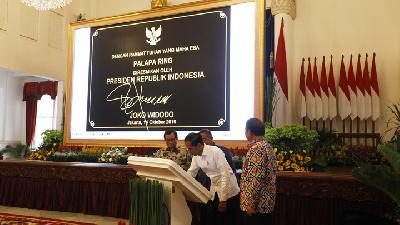
The promise of fast and cheap Internet access in outer regions through the Palapa Ring has yet to materialize. The stumbling block is connecting the Internet to the optic fibre cable network.
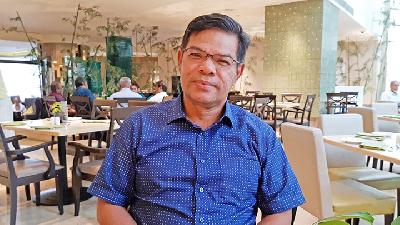
Malaysia's political crisis began when Mohamed Azmin Ali and a number of parliament members from Pakatan Harapan (The Alliance of Hope) met with opposition parties.

With 'stone' as the common thread, Babad Batu is a cerebral journey on a road with many side roads. Sapardis latest collection is encyclopedic, primordial and political.

Regarded as the Golden Age of Indonesian history, the vast maritime empire of Majapahit reached its apogee in the 14th century. Though it thrived for only 300 years (late 13th century to early 16th century), Majapahit was Indonesia's greatest state, the last in a long line of Buddhist and Hindu Javanese kingdoms. Islam had ostensibly erased Indian cultural traditions by the 16th century, yet Buddhist-Hindu traces can still be seen in the rituals and architecture of the kraton courts of Bali and central Java, and innumerable motifs and styles of the earlier cultures are found everywhere in Indonesian art.

For the second time this year, and against his doctor's advice, senior economist Gustav F. Papanek from Boston University returned to Indonesia. With a new government in place, this 87-year-old former advisor to the 'Berkeley Mafia'influential economists of the New Order erafelt the need to address a very urgent problem: The declining income of the poor, which as he noted "is immoral and also politically undesirable; therefore, it is important to take substantial steps to increase their income. The only way you can do that is by providing industrial jobs."
Although he was unable to meet President Joko Widodo, he managed to meet Sofyan Djalil, Economic Coordinating Minister; General Moeldoko, Armed Forces Chief; and ChatibBasri, former Finance Minister, and gave talks in three universities and Bank Mandiri as well as numerous interviews with the media. In a packed schedule, averaging two presentations a day, he found ways to push his ideas.

The banking business is in a flux as a result of the war of interest rates among banks. But the owner of the Mayapada Group, Dato Sri Tahir, is optimistic that the banking sector in Indonesia will continue to grow. "Growth depends on situations and conditions," Tahir told Tempo, two weeks ago. Having travelled all over the world, Tahir concluded that the best investment opportunities are still found in Indonesia.
He believes that investment opportunities in Indonesia are still better and that includes the business prospects of his Mayapada Group. He told Tempo reporter Christine Munthe in an interview that he would never sell Mayapada for whatever price. Excerpts:

Slum dwellings can be found throughout the Sunda Kelapa zone. Developing the area will require a major clean up.

Early in March, Agus Aris Munandar, an archeology professor at the University of Indonesia, presented a controversial lecture: there were no canals in Majapahit. He refuted all theories that Majapahit was a canal city, including the intensive research by senior archeologist Mundardjito. How did Mundardjito react?

Lured by bombastic ads on local and national television, thousands of cancer patients have become victims of the Harapan Baru traditional Chinese clinics, particularly its branch in Medan, North Sumatra. Harapan Baru guarantees cures with its herbal treatment while infusing patients intravenously with chemotherapy, an illegal procedure given that the traditional healers are not licensed to practice modern medicine. Steroids about 200 times the strength of morphine are another 'magical' cure. This medical and ethical violation has been going on for years, yet the regulatory seem to turn a blind eye.

A number of researchers have been to Holland in search of traces of the Sundanese dangding poetry of Hasan Mustapa, trying to find original manuscripts of this little known literary figure.

The burial ritual for Granny Kapa involved 400 residents, a month’s preparation, and costs around Rp1 billion.

He was known to be close to Japan but he was smart enough to lessen their pressure and to usher in the proclamation of Indonesia’s independence.

Japan’s Democratic Party won a landslide victory in the recent general election. But the public still doubts Yukio Hatoyama’s capability as the new Prime Minister.

This travel account penned by 21 Indonesian architects in Japan is not merely concerned with buildings.

There have been increasing demands to implement one of the key elements of the 1998 Reforms. Indeed, a number of things have been achieved, like cutting down the military’s political rights in parliament during the 2004 General Elections. Law No. 34/2004 on the TNI says the TNI businesses must be cleaned up. After the data collection team—implemented by Secretary of State-Owned Enterprises, Said Didu—verification will be carried out by the National Team on TNI Assets Takeover, led by Erry Riyana Harjapamekas.

For years, a timber mafia worked in unison to plunder the forests of Ketapang, West Kalimantan. They consist of dealers, loggers, members of the Forestry Office, police officers, officials of the Forestry Department and authorities from the local regency government. The Joint Team of National Police Headquarters and the Forestry Department estimates that state losses amount to Rp32.4 trillion annually. This is equivalent to 26 times the 2008 regional budget for West Kalimantan province.
Three weeks ago, the Joint Team was able to dismantle the mafia’s timber network in Ketapang. Among those arrested were the head of the Ketapang Office of Forestry, the Chief of the Ketapang District Police, and a candidate for the office of regent. Tempo reports from Ketapang.

The crewmen of a Japanese ship abducted in the Malacca Strait were released. Tokyo has urged that security in the area be increased.

One Japanese cosmetic company holds 24 patents over Indonesian indigenous plants. Must we now pay taxes on the spices in our own backyards?
Independent journalism needs public support. By subscribing to Tempo, you will contribute to our ongoing efforts to produce accurate, in-depth and reliable information. We believe that you and everyone else can make all the right decisions if you receive correct and complete information. For this reason, since its establishment on March 6, 1971, Tempo has been and will always be committed to hard-hitting investigative journalism. For the public and the Republic.